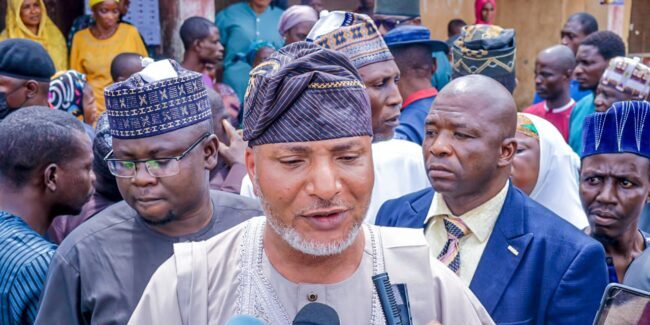Amidst the challenge of food security in the country, Senator representing Kwara Central, Saliu Mustapha, has advised the Federal Government to make agriculture studies compulsory at the secondary school level.
Senator Mustapha who incidentally is the Chairman of the Senate Committee on Agriculture and Rural Development, made the appeal on Thursday at a lecture organised by the Department of Agricultural Extension and Rural Development, University of Ilorin.
Represented by by Prof. Binta Sulyman of the Kwara State University, Malete, Senator Mustapha, in his key note address emphasized the need to move agriculture beyond mere rhetoric and policy pronouncements, arguing that practical agricultural education from an early age would prepare future generations to see farming as a viable profession and not just a subsistence activity.
He said, “We need to get serious about agriculture if we are to feed our growing population and reduce our over-reliance on imports.
“Making agriculture a compulsory and practical subject in secondary schools is a critical step in that direction.”
Senator Mustapha, who decried the attitude of Nigerian youths towards farming declared that exposure to the modern, technology-driven aspects of agriculture such as mechanised farming, agribusiness, and sustainable practices, could spark renewed interest in the sector.
He said:” Countries like Israel and India have demonstrated how a strong emphasis on agricultural education can turn around their food production capabilities. Nigeria must follow suit by ensuring that every child learns not only the theory of farming but the practical aspects as well.”
The Senator also stressed that compulsory agricultural studies would help Nigeria address rising unemployment rates, as it would equip young people with skills to venture into farming, agribusiness, and related industries. He added that an agrarian-focused educational curriculum could produce a generation of problem-solvers who can contribute meaningfully to reducing the nation’s food import bill.
“Beyond feeding ourselves, we must see agriculture as a business. Agriculture should not just be about producing food for the table, but it should be viewed as a business model that can generate wealth for millions of Nigerians,” he added.
Chairman of the Senate Committee on Agriculture and Rural Development further called on stakeholders in education, agriculture, and policymaking to collaborate closely in ensuring the implementation of these ideas. He lauded the Federal Ministry of Education for its curriculum revision efforts, describing it as a step in the right direction but cautioned that policy must translate into real-world action.
“There has been enough talk. What we need now are concrete actions, and that includes making sure that schools are equipped with the necessary facilities—farms, greenhouses, and modern farming tools—to make this hands-on agriculture education a reality,” he stated.
ALSO READ THESE TOP STORIES FROM NIGERIAN TRIBUNE
Tell Nigerians cost of your PMS, PETROAN tells Dangote Refinery
